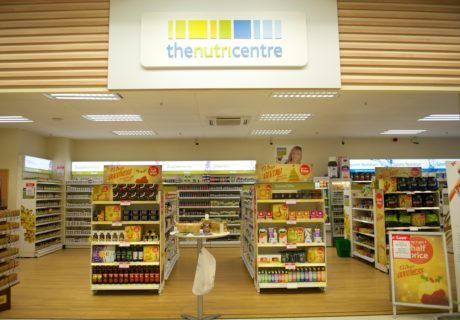NutriCentre’s new managing director Amee Chande comes to the post with formidable retail credentials. Most recently she was MD at Staples UK, and before that she held a senior role at Walmart after a stint running projects at McKinsey. She’s a big advocate of the compelling store experience – an admirer of Whole Foods and Liberty – but says online will play a decisive role in driving retail sales in the future. And she is adamant there is a huge opportunity for the health and wellbeing sector that is still yet to be grasped. Jim Manson has been talking with her.
Amee Chande is just two months into her new job as managing director of NutriCentre and already she is re-imagining the business. But she also thinks that it’s a good time to re-imagine the UK natural health sector.
Chande says there is a “huge opportunity” for the health and wellbeing industry yet to be grasped. From her perspective – a Canadian, with senior retail experience in the US sector – consumer awareness of health and wellbeing is far higher in North America. “I would say it’s higher for both the component of eating healthily and the component of living an active lifestyle”.
Rising awareness levels, coupled with a growing desire to take personal responsibility for health and wellbeing, is driving strong growth in the US, where the retail model successfully entices more people to the category. Chande acknowledges cultural differences – less access to affordable healthcare in the US, for example – but thinks the broad trend of ‘self care’ is coming to the UK.
In one sense this would be the continuation of ideas and trends in the health space that are taking root in the US and then migrating to the UK. The problem has been that penetration through traditional channels has remained persistently low in Britain.
Different scale of engagement
“All the trends point to great things for the health and wellbeing industry. There’s a fantastic story to be told and we are at a precipice, just beyond which is an entirely different scale of engagement. But at the moment I don’t see it happening here.”
Chande sees an opportunity to transform the natural health industry. And she sees NutriCentre as a catalyst for this transformation, especially with the “resource and presence of Tesco behind it”.
“The combination of NutriCentre’s passion and knowledge, and Tesco’s leadership is a powerful one. Tesco has huge resources, of course, but it also supports NutriCentre’s ambitions and respects its history. There is no pressure to turn NutriCentre into a Tesco brand and it’s seen as a completely independent business which, in turn, draws in brands that are really distinctive”.
“The combination of NutriCentre’s passion and knowledge, and Tesco’s leadership is a powerful one. Tesco has huge resources, of course, but it also supports NutriCentre’s ambitions and respects its history. There is no pressure to turn NutriCentre into a Tesco brand”
Just the beginning
Chande says that NutriCentre has made some good inroads – with its 14 stores, website and Nutri Answers service – but adds the business is just at “the beginning of our journey”.
She explains: “We need to re-think the entire space. The challenge is to do more than simply open more stores. We actually need to provide new ways to support people to live healthily.
“What’s missing now? For a lot of people it’s the answer to the question ‘what can I do with all the information Dr Google is giving me?’ The store environment sometimes just adds to the complexity. People are overwhelmed by thousands of SKUs. It can be daunting.”
Against this backdrop, NutriCentre is working on two key areas. The first is the shopping experience – both online and offline. The aim is to create an experience that people find comfortable and welcoming. The second is to improve ways of transmitting knowledge – whether that’s primarily by using online tools or in-store nutritionists has yet to be determined.
The way Chande sees it almost anything is up for discussion. “We see ourselves as a start-up, giving ourselves permission to try new ideas to see if we can make them stick.” She readily concedes that the current NutriCentre stores “aren’t the perfect examples of what we’ll see in the future”.
Taking shoppers on a journey
Chande says many consumers begin their health and wellbeing journeys in a supermarket. “That’s where the engagement starts. When people get more know-ledgeable and interested, they start to look for something more. At that point you need to create a physical environment where people feel comfortable – sometimes they will be talking about things that are quite emotional and personal.
“But we also need to look at how we package knowledge in other ways. It’s not always convenient to go into a store. So, in this new digital world we need to find the best ways to disseminate the information people need to help them make choices. I’m not sure we have the answers yet.”
But Chande is clear that online will play a growing, and maybe decisive, role in driving retail sales in future. “The majority of transactions may continue to take place in-store but growing numbers of purchases will start their research journey online. In some sectors – like technology and photography – online research is the starting point for 60-80% of sales. I think we can expect something just as big with health and well-being, where the emotional engagement is even greater.”
The really big opportunity
Chande recognizes that historically NutriCentre was focused on practitioner pro-ducts. At the other end of the spectrum are the products sitting on Tesco’s shelves. “The big opportunity is some-where in between,” she says.
“We want to take the NutriCentre brand and make it more accessible, but not swing the pendulum to the other extreme. And we’re looking for innovation all the way along that spectrum.”
NutriCentre is also exploring other business modes. For example, it’s looking at the potential to develop new B2B relation-ships. “That could be with practitioners, but it might also take us into gyms and workplace settings. It might also mean working with schools and hospitals.”
Taking health and well-being into new areas is part of realizing that bigger industry potential, says Chande. “Health and wellbeing is part of everyday life. The question is, how can we make access to it easier for people in their everyday lives?”
“Health and wellbeing is part of everyday life. The question is, how can we make access to it easier for people in their everyday lives?”
So does she see a bigger debate around partnerships between public health bodies and private suppliers? “No, I think we’re talking about something that is more a necessity than a debate. Public health is more about treating people when they’re sick. You spend a lot more money treating people when they’re already sick. We need a new paradigm.”
Let’s not be judgemental
Chande says the natural health sector can sometimes be perceived as judgmental. “Sometimes it can seem that people are being criticized for their shopping habits, for shopping in the wrong part of the store. You can easily create a ‘not good enough’ stigma. If you want to take people with you, you can’t afford to be seen in that way.”
Chande is very clear that the best way to take the health and wellbeing industry to the next level is for retailers and brands to work together. “Our message to suppliers and brands is that no one is more passionate about delivering the right experience and the best products than NutriCentre. Have we done that perfectly to date? No, I don’t think we have.
Brand champion
“In this industry – where two years, in research terms, is a long time – we have to stay fresh and current. We’ve got great skills at Nutri-Centre, but we need to work with others. We want to be a retailer that champions quality brands. And we have every intent to work with the industry. By leveraging our relationship with suppliers we can help many more people become engaged with the category. If we do that, there is an opportunity to transform this industry.”









